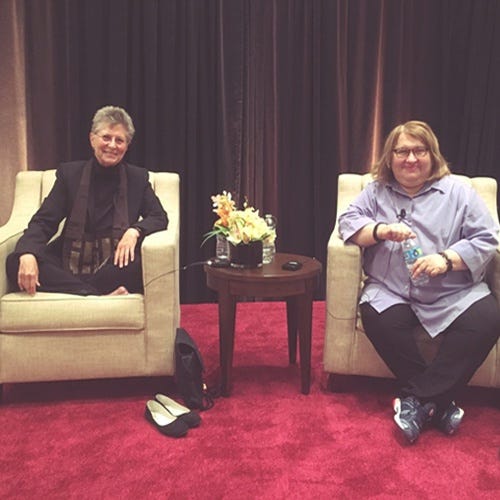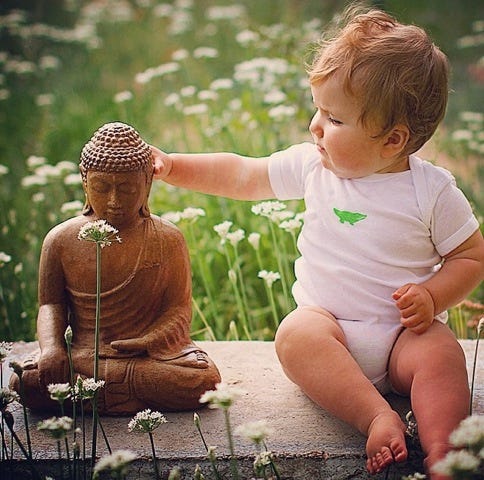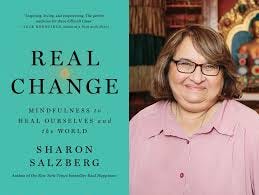When both of my parents turned 60-years-old, I told them that—in lieu of physical gifts—I wanted to have an experience with each of them. Anything they chose. No eye-rolling. My mom, always a rascal, chose an astrology conference. (That’s a topic for another time.) My dad, a longtime meditator and Buddhist, chose a silent retreat with two of his favorite teachers: Roshi Joan Halifax and Sharon Salzberg.

Roshi Joan Halifax on the left and Sharon on the right.
I can’t tell you what a relief I found the silence to be. And I didn’t even know I needed it. I sat next to perfect strangers, eating soup, and felt their inherent worthiness. And my own. It was quiet and profound—a shift from the striving I’d been doing for so much of my 20s, always proving myself. Here, I just sat in presence. Beside my dear dad.
That was the first of so many gifts Sharon has given me over the years. Her meditation instruction is accessible, full of humor, and steeped in the humility of someone who truly lives her wisdom of transforming our wounds into compassion. She’s collaborative, savvy, and political. And her latest book, Real Change, is a perfect crystallization of what it means to go inward in order to act outward with wisdom and courage. I interviewed her this week for Berkeley’s Book Festival (that video will go live next month; I’ll send it around.) In the meantime, here are some of her insights…
Courtney Martin: You write, “I’ve learned that meditation can provide tools to help courage grow out of rage and resilience out of grief.” I can imagine a lot of people can relate to 2020 being full of rage and grief, so this is feeling very timely. But as you also say, many people think of meditation as only an inward-looking practice. Can you talk more about this foundational idea of meditation as a tool of justice?
Sharon Salzberg: I’ve long thought that one of the weirdest results of meditation is a powerful sense of connection to others – weird because meditation is a practice you might do all alone, and perhaps with eyes closed. It’s the perfect image of being solitary, even aloof. But what I’ve seen happens is that first you tend to get more connected to your own wish for a deeper kind of happiness – a sense of belonging, of feeling at home in your body, your mind, with one another, on this planet. There also comes a more visceral understanding of how fragile and uncertain life is, how one’s life can just turn on a dime. And the growing knowledge that both these are true for everyone.
There also comes a dawning, bone deep realization of how interconnected our lives are. I’ve long asked, when I go into an organization to teach,
“How many other people need to be doing their jobs well for you to do your job well?”
We might feel alone and cut off, especially now in times of physical isolation for many, but a deeper look provides layer upon layer of relationship and connection. How many people, for example, were involved in providing the food we ate today? Meditation is one way to see more clearly the links of interconnection, and the corollary insight is that everyone counts, everyone matters. Hence, a tool of justice.
You write, “Deep acceptance is not inertness.” Can you say more about that? I get confused on that one.
It is confusing! For a while I was trying to use the word acknowledge rather than accept, since acceptance so often implies succumbing. I’ve seen in my own mind that a full on, direct, being with the truth of something is the beginning of the best kind of movement towards change. Before then, while a part of me is avoiding or denying or trying to repackage the reality of a situation, it’s almost as though that part of my energy is not available to work towards change. Acknowledgment or acceptance also doesn’t mean glorifying what’s happened or is happening, or denying the pain of it. It reminds me of a quotation from Roshi Joan Halifax, who said,
“Don’t try to force yourself to see the traumas of your past as gifts --- they are givens.”
When I can come to that place of recognition – or as the Dalai Lama said about 9/11, “It happened,” then I find I can take the next steps.

Baby Maya befriending a Buddha.
You started a practice of meditation for kids in detention centers and asked others to join you through a hashtag #mettaminute. You got some pushback from people online who said it was minimizing the trauma by simply meditating which you wisely replied to by reminding people that it wasn’t the only action you were doing or recommending others do, but one of many. Why do you think we’ve gotten into such binary thinking like this? Does meditation help one resist this kind of thinking?
I think meditation can give us a sense of perspective, flexibility, and maybe more than anything a sense of space. In a big enough space, lots can exist side by side. We’re taught that everything is a zero sum game…I win, you lose. Sorrow and joy can’t co-exist. We have to protect our health from Covid 19 or open the economy. Compassion and strength are antithetical.
Samantha, a young woman from the Parkland, Florida community, whose mother is a teacher at Marjorie Stoneman Douglas high school and survived the school shooting, has commented to me about her uneasiness at enjoying a mindfulness retreat, knowing that it was happening because a tragedy had erupted in her community. She asked me how to get over what had happened to enjoy the gifts of her life. I replied that I don’t think we actually get over things like that, we learn to hold them both at the same time. In an open mind and open heart, there is room for both.
You write, “How do we keep witnessing the pain, especially if it is so evocative of the most difficult times in our own lives?” How do we keep taking it in? It feels so overwhelming.
I’ve found I need a sense of my own limits, awareness of what activates me the most, and practical tools to help me come back into the moment and not be lost in what can seem like my helplessness in face of it all. As a personal example, I see that deceit on the part of public figures can transport me to the uneasiness of my childhood, with those in charge denying the plain truth of what I could see and sense, and I know I can only take so much of that in.
I also have learned that “keep witnessing” doesn’t mean witness unremittingly, until I get exhausted. I use awareness of my breath and exercises like that to bring me back in touch with this moment, knowing that if I project into a seemingly endless, terrible future I will automatically feel defeated. I know my own resilience in facing suffering is a strong need, not something selfish, and so for me different kinds of meditation are how I find energy and perspective. Others of course might find these elsewhere, but I believe we really need them as ongoing sources of strength.
I think a lot of activists embrace anger, and then some think of anger as sort of unenlightened...like if I meditated more, if I was more mature, this anger wouldn’t eat me up. Can you talk about how to acknowledge and feel anger without letting it define you?
I think that feeling anger and being eaten up by anger are best seen as distinct things. One of my favorite sayings is, “We feel what we feel.” Another favorite saying of mine is “Some things just hurt” – it’s not because we have a bad attitude or need to adjust our thinking – some things just hurt. Which logically leads to we feel what we feel. These things are true no matter how enlightened we are, and we shouldn’t blame ourselves for what we feel.
What we then do with those feelings, how we relate to them, whether we want them to be the determining factor in actions we take is another question. Anger is such a complex emotion, often laced through with sadness and fear and a sense of helplessness. If we can be mindful of the anger, instead of either being overcome by it or trying to push it away, we get to see all that complexity and decide how we want to act. In that way we channel the energy of the anger instead of being consumed by it.

Check out Sharon’s work here. She’s got an awesome podcast, great social media output, and a new book.




I really love this idea of doing a experience with each of your parents for their birthdays. I don't live near my parents, and there are raging wildfires and COVID in the way, BUT, if we get through this, I want to remember this idea for their big 7-0s, which are coming right up. I'm just realizing I have NO IDEA what they would pick, or if THEY will know what they want.
Beautiful and timely, thanks Courtney!